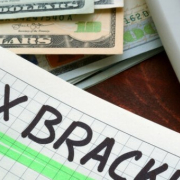Why Do I Owe Taxes This Year? Six Reasons You May Not Get A Refund
 Filing your taxes is a task that few people enjoy. But the frustration is worth it once you receive a refund.
Filing your taxes is a task that few people enjoy. But the frustration is worth it once you receive a refund.
This year, however, many financial experts are warning that refunds will be smaller.
You may even find yourself owing money instead of getting some back.
According to Logan Allec, an accountant and owner of tax debt relief company Choice Tax Relief, there are mulltiple reasons you may not get a refund this year. Let’s look at six common reasons some people could owe money to the IRS.
1. You Earned More Than $600 From A Side Hustle
Increasingly, many people are earning money from a side hustle in addition to their full-time jobs. If your side hustle brought in more than $600 in 2022 and you received that income through an app like Venmo or PayPal, you’ll receive Form 1099-K from the payment platform in January.
According to Allec, there will be more 1099s going out this tax season because of the lowered 1099-K filing threshold. Prior to 2022, you wouldn’t receive a 1099-K unless you had received more than $20,000 in payments or completed over 200 transactions with that payment processor.
But for the 2022 tax year, payment processors have to issue 1099-Ks to anyone who received more than $600 in payments for goods and services, even if it was only one transaction. That means many people who should have been reporting income from a side hustle didn’t because they didn’t earn enough to receive a 1099-K. Allec says that due to these new guidelines, they’ll now be forced to report their income.
2. You’re Self-Employed
If you’re self-employed, you’re responsible for paying your own quarterly taxes. Your estimated quarterly payments for 2023 are due on April 18, June 15, September 15, and January 15, 2024.
If you underpay your quarterly taxes — or fail to pay them — you could owe money at the end of the year. And since you’re obligated to make estimated quarterly payments, the IRS could charge you additional penalties and interest.
But you’re not just paying income taxes. An employer must pay half of your Social Security and Medicare taxes when you have a job. If you’re self-employed, you have to foot the entire bill yourself. However, you can deduct the employer-equivalent portion of that when figuring your adjusted gross income.
3. You Changed Jobs
If you’ve transitioned into a new job in the past year, this can have tax implications.
“Changing jobs midway through the year will affect your tax liability if your income changed between the two jobs,” Allec explains.
If your new job pays more and moves you into a higher tax bracket, you’ll naturally end up owing more come tax season. But Allec says that changing jobs can affect your expected refund for reasons other than the change in tax liability.
“Let’s say that halfway through the year, you go from a job making $25,000 per year to a job making $12,000 per year. Unless you prepare your Form W-4 in a specific way, that second job may not withhold any federal income tax from your paycheck because your $12,000 expected total annual earnings are less than your standard deduction,” Allec explains.
So while you paid your federal income taxes on the $12,500 you earned during the first half of the year, you didn’t pay any on the $6,000 you made during the remainder of the year. This could cause you to owe money come tax time because you’ll have to pay taxes on that $6,000 since none were withheld during the year.
4. You Collected Unemployment
Unemployment benefits are taxable, but most states don’t automatically withhold your taxes. Benefit recipients can usually choose whether to pay taxes through withholding or by making estimated payments.
If you received unemployment benefits in 2022, you should receive Form 1099-G by the end of January so you can report the amount on your federal tax return. If you haven’t paid any income taxes on the benefits you received, you may owe money when you file.
5. You Lost Eligibility For Certain Tax Credits Or Deductions
Losing eligibility for certain tax credits and deductions could cause you to owe money come tax season. A tax deduction reduces your taxable income before your tax liability is calculated, while a tax credit further reduces your tax bill on a dollar-for-dollar basis.
For instance, Allec points out that the child tax credit dropped from being worth up to $3,600 per dependent in 2021 to up to $2,000 per dependent in 2022. The income limits to qualify have also been lowered to pre-pandemic levels, shutting out many families who received the expanded credit in 2021.
“And there are no more Recovery Rebate Credits for missed stimulus payments or stimulus payments for children born during the tax year,” Allec adds.
6. You Sold Stock Or Cryptocurrency
Finally, if you sell investments in a non-retirement account and earn a profit, you could be on the hook for capital gains taxes. These investments include things like stocks, cryptocurrency, mutual funds, and exchange-traded funds (ETFs).
Any stock or crypto gains should be reported on your tax return. You’ll be taxed on the difference between your basis (usually your purchase price, but sometimes that includes an adjustment) and the proceeds from the sale. The amount you’re taxed will depend on how long you owned the investment before selling it and your total income for the year.
While taxpayers usually have to pay capital gains taxes on profits received from investments, Allec says there are exceptions, like if you have capital losses that equal or exceed your capital gains for the year.
“If this is the case, you’ll owe no capital gains taxes on your stock or crypto you sold at a gain because your capital losses will have wiped them out,” Allec says.
Source: Business Insider



